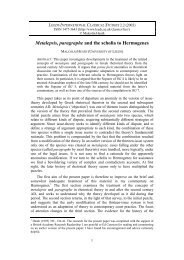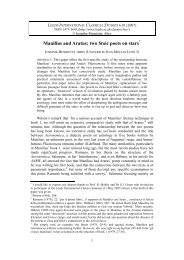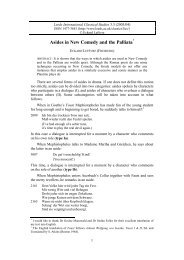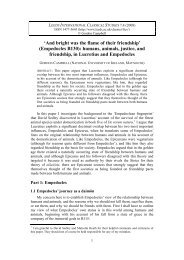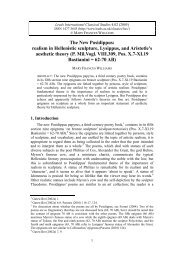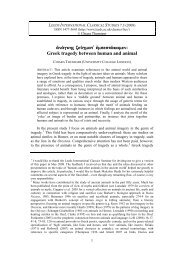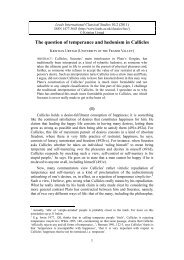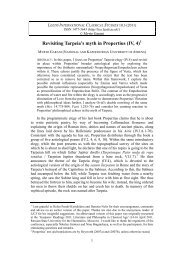Teiresias, the seer of Oedipus the King - Leeds International ...
Teiresias, the seer of Oedipus the King - Leeds International ...
Teiresias, the seer of Oedipus the King - Leeds International ...
Create successful ePaper yourself
Turn your PDF publications into a flip-book with our unique Google optimized e-Paper software.
HANNA M. ROISMAN, TEIRESIAS, THE SEER OF OEDIPUS THE KING<br />
change it. Much <strong>the</strong> same rationale inheres in <strong>Teiresias</strong>’ subsequent explanations<br />
<strong>of</strong> why he will not reveal all that he knows. I quote <strong>the</strong>m again: ‘Of <strong>the</strong>mselves<br />
things will come’ (341) and, ‘It is not destined that you should fall by me, since<br />
Apollo ... is sufficient’ (376f.). 15 The first says that <strong>the</strong>re is no point in making<br />
painful disclosures when <strong>the</strong> truth will emerge in due course—a ra<strong>the</strong>r strange<br />
claim for a <strong>seer</strong> whose trade is in knowledge, but o<strong>the</strong>rwise not unreasonable. The<br />
second expands on <strong>the</strong> first with <strong>the</strong> claim that revelation is pointless because it<br />
can do nothing to change fate.<br />
In o<strong>the</strong>r words, <strong>Teiresias</strong> splits knowledge from revelation and highlights <strong>the</strong><br />
pointlessness <strong>of</strong> telling what he knows. This un<strong>seer</strong>like conduct raises <strong>the</strong><br />
question <strong>of</strong> what value knowledge has in a world in which destiny is inexorable—<br />
in a world where knowledge cannot change <strong>the</strong> course <strong>of</strong> events or even alleviate<br />
suffering. 16 This inherent contradiction between a fixed and irrevocable destiny<br />
and <strong>the</strong> idea <strong>of</strong> knowledge as a value seems to have exercised Sophocles and his<br />
audience in much <strong>the</strong> same way that generations <strong>of</strong> Christian philosophers would<br />
subsequently be wracked by <strong>the</strong> inherent contradiction between <strong>the</strong> omniscient<br />
and omnipotent Christian God and man’s free will. 17<br />
The play leaves <strong>the</strong> question deliberately unresolved. Knowledge is treated in<br />
<strong>the</strong> play as a most ambiguous good. 18 <strong>Oedipus</strong>’ knowledge <strong>of</strong> <strong>the</strong> world,<br />
exemplified in his solving <strong>the</strong> riddle <strong>of</strong> <strong>the</strong> Sphinx, saves Thebes from siege and<br />
death, so it is clearly <strong>of</strong> benefit. Yet this same knowledge also leads directly to his<br />
election as king and, with that, to his incestuous marriage with his mo<strong>the</strong>r, <strong>the</strong><br />
Theban queen, and all <strong>the</strong> terrible devastation that follows. <strong>Oedipus</strong>’ belatedly<br />
acquired self-knowledge, his learning that he is <strong>the</strong> source <strong>of</strong> <strong>the</strong> plague in<br />
Thebes, enables him to remove himself and thus put an end to his people’s<br />
suffering. But it also leads to his self-blinding and <strong>the</strong> destruction <strong>of</strong> <strong>the</strong> House <strong>of</strong><br />
Labdacus. 19<br />
The commonplace scholarly wisdom is that <strong>Oedipus</strong>’ self-knowledge came<br />
too late and that his knowledge <strong>of</strong> <strong>the</strong> world was insufficient without self-<br />
15 It is <strong>the</strong>refore no surprise that <strong>Oedipus</strong> declares at <strong>the</strong> end that ‘it was Apollo, friends, Apollo’<br />
(1329), who caused his blinding. He was told by <strong>Teiresias</strong> that Apollo would be his ultimate bane.<br />
See Parker (1999) 16f., who maintains that such attributions <strong>of</strong> divine involvement occur<br />
especially in situations <strong>of</strong> extreme emotion, usually <strong>of</strong> anguish. He does not connect <strong>Oedipus</strong>’<br />
exclamation with <strong>Teiresias</strong>’ statements but with <strong>the</strong> fact that ‘as no one could deny, what Apollo<br />
had decreed had come to pass’. Winnington-Ingram (1980) 176-8 discusses <strong>the</strong> question: ‘Why<br />
does <strong>Oedipus</strong> attribute <strong>the</strong> accomplishments <strong>of</strong> his evils including ... his own act <strong>of</strong> self-blinding to<br />
Apollo?’ (178).<br />
16 Lattimore (1975) 108f.: ‘It is not that <strong>the</strong> gods will not help or inform <strong>Oedipus</strong>—<strong>the</strong>y cannot;<br />
<strong>the</strong>ir knowledge and very existence are too alien from his ... <strong>Teiresias</strong> represents <strong>the</strong> gods <strong>of</strong> <strong>the</strong><br />
<strong>Oedipus</strong> Tyrannus and dramatizes this alienation.’<br />
17 Cf. Winnington-Ingram (1980) 153f.<br />
18 Cf. Socrates’ remark in <strong>the</strong> Apology that all ‘human knowledge is <strong>of</strong> little or no value’<br />
(¢nqrwp…nh s<strong>of</strong>…a Ñl…gou tinÕj ¢x…a stˆn kaˆ oÙdenÒj, 23a). The idea that human<br />
knowledge is imperfect was common in Greek thought long before Plato wrote down Socrates’<br />
expression <strong>of</strong> it.<br />
19 Cf. Hoey (1969) 298: ‘It seems to emerge that in <strong>the</strong> <strong>Oedipus</strong> Rex <strong>the</strong> two great annihilative<br />
agencies are knowledge and generation.’<br />
8



